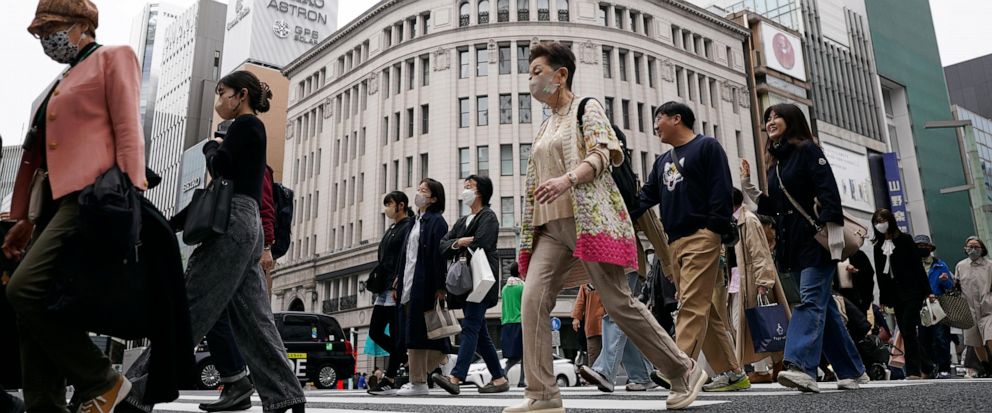The lower yen has been a boon to Japan's economy
The Japanese economy saw a more rapid growth rate than initially anticipated during the period from April to June, primarily credited to the favorable impact of the nation's depreciated currency on its export sector. Read More: Netherlands contracted 0.3% in the second quarter, whereas France and Belgium rose somewhat During the specified time, the third largest global economy experienced a notable increase in its Gross Domestic Product (GDP), with a growth rate of 6% on an annualised basis. The growth rate exceeds economists' forecasts by approximately two-fold and represents the most substantial increase observed in over three years. The depreciation of the yen proved advantageous for exporters, as it resulted in a decrease in the price of Japanese-manufactured products, becoming them more affordable for global consumers. What is Depreciation of Currency? Currency depreciation is a term used to describe the decrease in the exchange value of a nation's currency when compared to other currencies within a floating rate system. The determination of the currency depreciation rate for a certain country is dependent upon the analysis of its trade imports and exports. The demand for foreign items leads to an increase in imports, which in turn leads to investments in foreign currency and depreciation of the domestic currency. For instance, when the exchange rate changes from 1$ = Rs. 70 to $1 = Rs. 80, it indicates a depreciation of the Indian currency. This implies that people of the United States can now purchase goods worth Rs. 80 with the same $1, when previously they could only purchase goods worth Rs. 70. Hence, exports from India become cheaper. In contrast, before, individuals in India were required to spend Rs. 70 in order to acquire goods worth $1, however presently, due to the depreciation of the Indian rupee; they must now spend Rs. 80 to obtain the same value of goods. Consequently, the cost of importing goods from the United States increases for Indian consumers. Impact of Depreciation on Japanese Economy The currency of Japan has experienced a significant decline in value when compared to major global currencies during the past several months, resulting in a depreciation of over 10% against the United States dollar within the current year. According to Martin Schulz, the chief economist at Fujitsu, the favourable GDP figures can be attributed to the depreciation of the yen. GDP is one of the best ways to measure how well or poorly a business is doing. It helps businesses decide when to grow and hire more people and helps the government decide how much to spend and tax.  Car companies like Toyota, Honda, and Nissan have been making more money in recent months because there has been more demand for their goods. Even though a weak currency makes goods more expensive, the prices of commodities like oil and gas have gone down in the past few months. Because of this, the value of imports has gone down, down 4.3% from the previous quarter. EY's Nobuko Kobayashi said this was "a major cause of GDP growth." Since the government lifted border controls at the end of April, there have been more tourists visiting Japan. Japan's national tourism body says that as of June, the number of foreign tourists had returned to more than 70% of what it was before the pandemic. After China lifted its ban on group travel this month, tourists are also likely to spend more, which will help the economy even more. Before the outbreak, more than a third of the money tourists spent in Japan came from China. This helps make up for the fact that the countries own consumption is coming back slowly after the plague. Japan's economy is slowing down, so the second half of the year will be challenging, Mr. Schulz warned. Marcel Thieliant of Capital Economics remarked that the numbers "weren't as impressive as the headline." He brought up a number of problems, such as the fact that private spending, which makes up more than half of Japan's economy, was going down. The rate at which Japanese workers' pay has gone up is the fastest it has been in 28 years. However, because inflation is close to a four-decade high, real wages have been going down for well over a year.
Car companies like Toyota, Honda, and Nissan have been making more money in recent months because there has been more demand for their goods. Even though a weak currency makes goods more expensive, the prices of commodities like oil and gas have gone down in the past few months. Because of this, the value of imports has gone down, down 4.3% from the previous quarter. EY's Nobuko Kobayashi said this was "a major cause of GDP growth." Since the government lifted border controls at the end of April, there have been more tourists visiting Japan. Japan's national tourism body says that as of June, the number of foreign tourists had returned to more than 70% of what it was before the pandemic. After China lifted its ban on group travel this month, tourists are also likely to spend more, which will help the economy even more. Before the outbreak, more than a third of the money tourists spent in Japan came from China. This helps make up for the fact that the countries own consumption is coming back slowly after the plague. Japan's economy is slowing down, so the second half of the year will be challenging, Mr. Schulz warned. Marcel Thieliant of Capital Economics remarked that the numbers "weren't as impressive as the headline." He brought up a number of problems, such as the fact that private spending, which makes up more than half of Japan's economy, was going down. The rate at which Japanese workers' pay has gone up is the fastest it has been in 28 years. However, because inflation is close to a four-decade high, real wages have been going down for well over a year.
 Car companies like Toyota, Honda, and Nissan have been making more money in recent months because there has been more demand for their goods. Even though a weak currency makes goods more expensive, the prices of commodities like oil and gas have gone down in the past few months. Because of this, the value of imports has gone down, down 4.3% from the previous quarter. EY's Nobuko Kobayashi said this was "a major cause of GDP growth." Since the government lifted border controls at the end of April, there have been more tourists visiting Japan. Japan's national tourism body says that as of June, the number of foreign tourists had returned to more than 70% of what it was before the pandemic. After China lifted its ban on group travel this month, tourists are also likely to spend more, which will help the economy even more. Before the outbreak, more than a third of the money tourists spent in Japan came from China. This helps make up for the fact that the countries own consumption is coming back slowly after the plague. Japan's economy is slowing down, so the second half of the year will be challenging, Mr. Schulz warned. Marcel Thieliant of Capital Economics remarked that the numbers "weren't as impressive as the headline." He brought up a number of problems, such as the fact that private spending, which makes up more than half of Japan's economy, was going down. The rate at which Japanese workers' pay has gone up is the fastest it has been in 28 years. However, because inflation is close to a four-decade high, real wages have been going down for well over a year.
Car companies like Toyota, Honda, and Nissan have been making more money in recent months because there has been more demand for their goods. Even though a weak currency makes goods more expensive, the prices of commodities like oil and gas have gone down in the past few months. Because of this, the value of imports has gone down, down 4.3% from the previous quarter. EY's Nobuko Kobayashi said this was "a major cause of GDP growth." Since the government lifted border controls at the end of April, there have been more tourists visiting Japan. Japan's national tourism body says that as of June, the number of foreign tourists had returned to more than 70% of what it was before the pandemic. After China lifted its ban on group travel this month, tourists are also likely to spend more, which will help the economy even more. Before the outbreak, more than a third of the money tourists spent in Japan came from China. This helps make up for the fact that the countries own consumption is coming back slowly after the plague. Japan's economy is slowing down, so the second half of the year will be challenging, Mr. Schulz warned. Marcel Thieliant of Capital Economics remarked that the numbers "weren't as impressive as the headline." He brought up a number of problems, such as the fact that private spending, which makes up more than half of Japan's economy, was going down. The rate at which Japanese workers' pay has gone up is the fastest it has been in 28 years. However, because inflation is close to a four-decade high, real wages have been going down for well over a year. Next Story


